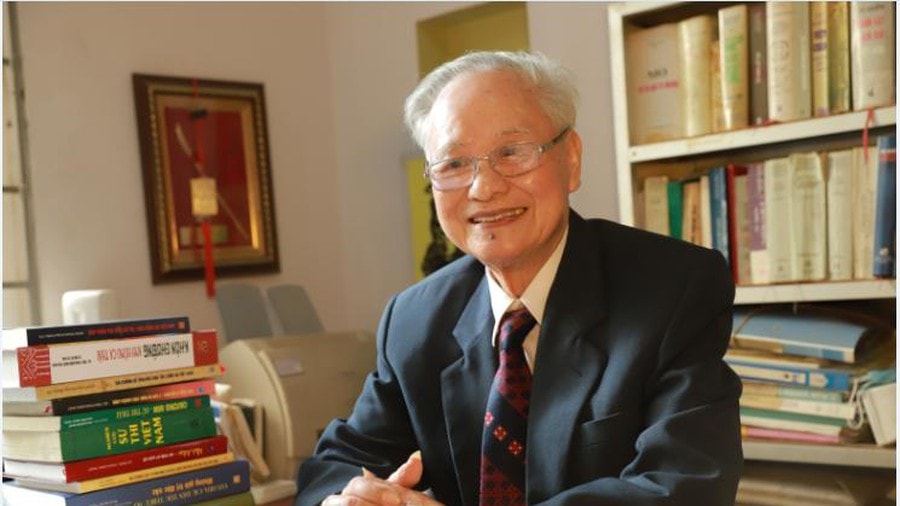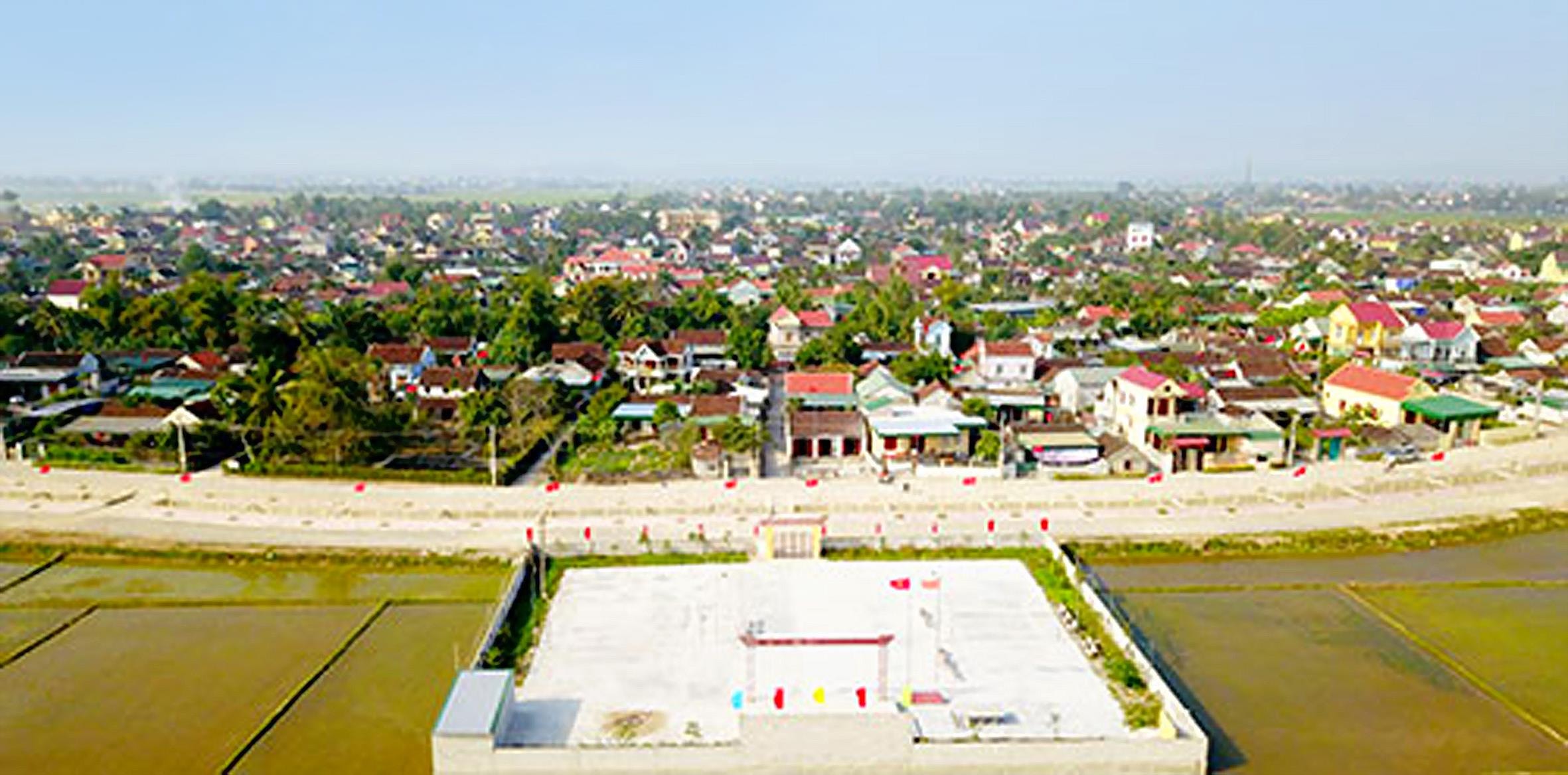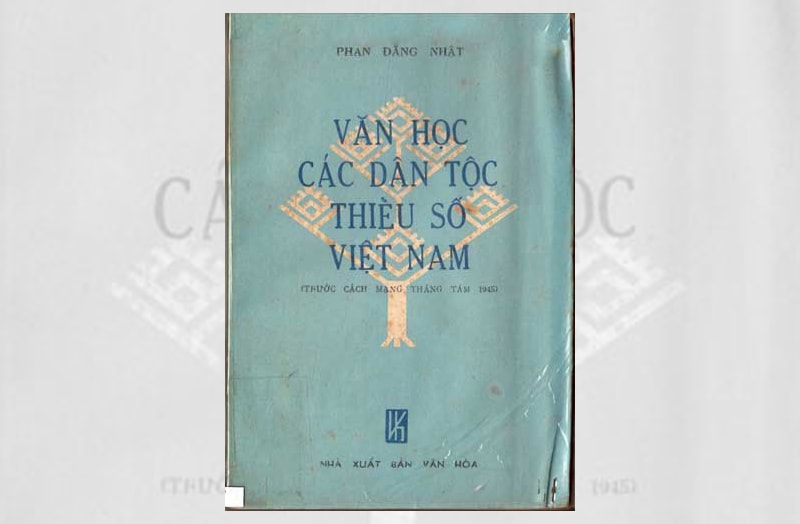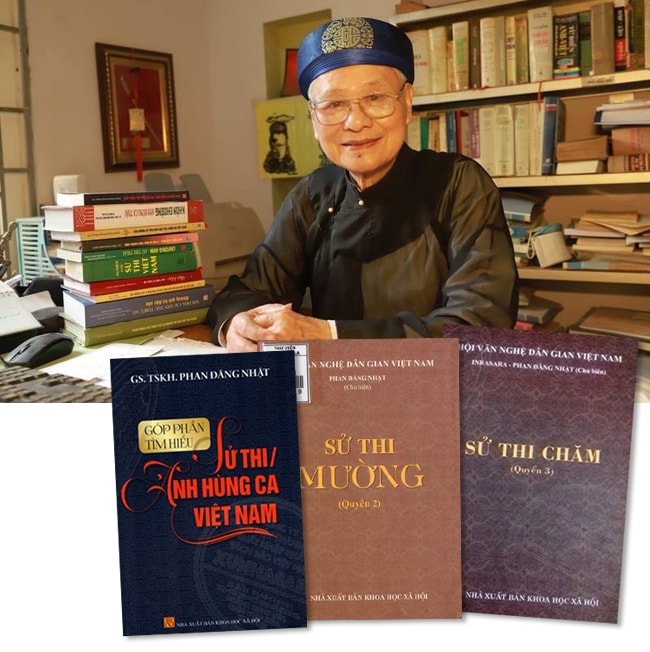Professor Phan Dang Nhat and the revival of Vietnamese epics
(Baonghean.vn) - For the domestic scientific community, Phan Dang Nhat made a great contribution when he distinguished Vietnamese epics from famous epic works of the world.
Editor's note:Professor, Doctor of Science Phan Dang Nhat was born into a patriotic family in Hoa Thanh commune, Yen Thanh district. He called the revolutionary Phan Dang Luu his uncle. Professor Phan Dang Nhat is a great personality, a profound intellect, and Vietnam's leading researcher on epics. On June 24, 2020, the respected Professor's heart stopped beating, he returned to the world of the wise, leaving behind the grief and gratitude of friends and cultural researchers for a man who devoted his life to the nation.
Nghe An Newspaper respectfully introduces an article by Prof. Dr. Nguyen Xuan Kinh - Vice President of the Vietnam Folklore Association, former Director of the Institute of Cultural Studies - Vietnam Academy of Social Sciences, a friend and colleague of Prof. Phan Dang Nhat. The article is excerpted from the work: "On the way to study the folklore of Vietnam's ethnic minorities" by Prof. Dr. Nguyen Xuan Kinh.
The excellent son of Dong village
Professor Phan Dang Nhat was born in 1931 in Dong village, Trang Thanh commune, now Phan Dang Luu hamlet, Hoa Thanh commune, Yen Thanh district, Nghe An province. In 1952, he was a teacher at Quynh Thien secondary school, Quynh Luu district. In 1960, he worked at the Northwest Department of Education. During nearly ten years of working in the Northwest region of the country, in addition to completing his professional duties, he was also passionate about collecting and studying the folk literature of ethnic minorities.
 |
| Professor, Dr. Phan Dang Nhat. Photo: Internet |
In 1963, in the Literary Research Journal, No. 2, the story “Chang Lu and Nang Ua” collected by Cam Trong and Phan Dang Nhat was published. In 1969, he moved to Hanoi, researching the literature of ethnic minorities at the Mountainous Region Department under the Ministry of Culture. From 1970 to the end of 1979, he worked at the Institute of Literature. From December 1979 to 1999, he worked at the Institute of Folklore Studies, under the National Center for Social Sciences and Humanities (Vietnam Academy of Social Sciences).
In 1984, Phan Dang Nhat was awarded the title of Associate Professor by the State. In 1989, he defended his PhD thesis at the Bulgarian Academy of Sciences on the topic "Basic characteristics of epics - khan in Vietnam". From the late 70s to May 1994, he was successively assigned the following management tasks: Deputy Head of the Department of Folklore of the Institute of Literature; Scientific Secretary of the Department of Folklore; Deputy Head of the Department of Folklore; Deputy Director, Acting Director and Director of the Institute of Folklore. From 1985 to February 1991, he was Deputy Editor-in-Chief of the Folklore Magazine. From the end of 1999, although he retired, he still worked hard and created, continuing to be invited to participate in the Scientific Council of the Institute of Folklore Research. In 2002, he was awarded the title of Professor of Literature.
Phan Dang Nhat's first research paper was "On the expression of national identity in the literary creation of ethnic minorities" co-written with Nong Quoc Chan, published in the Culture Newspaper in 1969, issues 8 and 10.
Phan Dang Nhat entered the field of folklore research somewhat later than many other authors, but he is very active in writing and has published many works. As of 2010, he is the author of 6 books; editor and co-editor of 9 books; co-author of 38 books, jointly printed proceedings, 120 articles published in Literature Magazine, Folklore Magazine, Vietnam Journal of Social Sciences, Communist Magazine, Nhan Dan Newspaper, People's Army Newspaper, Literature and Arts Newspaper...
 |
| A corner of Hoa Thanh commune (Yen Thanh) today. Photo: Thai Hong |
Leading expert in folklore studies
Phan Dang Nhat's contributions to folklore research are expressed in many aspects.
First of all, Phan Dang Nhat is one of the rare experts in our country in the field of research on folk literature of ethnic minorities.
In 1980, the book History of Vietnamese Literature, Volume I, compiled by the Vietnam Social Sciences Committee, was published. The book consists of 400 pages, three main parts, in which the literature of ethnic minorities is presented in 72 pages, written by Nong Quoc Chan and Phan Dang Nhat.
In 1981, the book Literature of Vietnamese Ethnic Minorities (before the August Revolution of 1945) by Phan Dang Nhat was published. In our country, this is the first book to systematically present the folk literature of ethnic minorities.
It can be said that in the book Literature of Vietnamese Ethnic Minorities, Phan Dang Nhat's thoughts on the literary process (through the literature of ethnic minorities) have been revealed. That is: The process from everyday communication language to poetic language; The process from folk poetry and fairy tales to narrative poems; The process from folk literature to written literature;...
According to Phan Dang Nhat, many ancient indigenous peoples in Vietnam originally had a common cultural heritage from the Dong Son and Sa Huynh periods. Later, for many reasons, they had to disperse, sometimes living very far apart, even having their relationships severed. However, these peoples still preserved the common cultural heritage of their early days. One of those common heritages is myths and epics. With that awareness, the researcher chose a separate path, different from the masters and seniors in the Vietnamese folklore community such as Dinh Gia Khanh and Cao Huy Dinh.
But folklore researchers in the country and around the world agree on one opinion: Professor Phan Dang Nhat is Vietnam's leading researcher on epics.
 |
| The book Literature of Vietnamese Ethnic Minorities by Professor Phan Dang Nhat. Photo courtesy |
The man who revived the Vietnamese epic
On the way to find Vietnamese epics, many people speculate that the ancient Vietnamese had epics from the Van Lang - Au Lac period, but today only fragments remain. This situation makes many people in the scientific community skeptical about the existence of a mythological system and a source of ancient Vietnamese heroic poems.
Phan Dang Nhat chose a new direction. He began to search for Vietnamese epics from ethnic minorities, and then returned to the Vietnamese people. The article “Comparing some legends in De dat de nuoc of the Muong people with legends about the founding of the country of the Vietnamese people” (1974), the book Ede Epic (1991), the joint article with Phan Ngoc “Attempting to reconstruct the Vietnamese - Muong myth system” (1991) are works that demonstrate this direction.
From 1973 to 1977, Professor Phan Dang Nhat used the terms heroic epic, epic, epic - mo. In 1973, he used the term "heroic epic" to distinguish it from epic in the broad sense with content corresponding to the term narrative (in Vietnam, it was not until 1983 that there was a distinction between heroic epic and mythological epic proposed by Vo Quang Nhon).
In 1986, in the Journal of Cultural and Artistic Research, Phan Dang Nhat published the article “Epic of Dam Xan and the method of researching folk culture”. According to him, the character of Dam Xan has three tasks: getting married, working, fighting to regain his wife, in which fighting to regain his wife is the central and main task. “The wealth, strength and prestige of Dam Xan are also the wealth and prestige of the village under Dam Xan’s rule. Only a community-based society like the Ede society in the heroic era can have this beautiful relationship between the hero and the whole society and it is that relationship that creates the heroic atmosphere”.
In June 1989, he defended his PhD thesis in Bulgaria with the topic: Basic characteristics of the epic - khan in Vietnam. If at the end of the third decade of the 20th century, Sabachier made France aware of a Vietnamese epic, then at the end of the 9th decade of the 20th century, with this thesis, Phan Dang Nhat for the first time comprehensively and convincingly introduced the Ede epic, which was recognized by scientists in an Eastern European country with a tradition of folklore research. Professor N.LNiculin, an expert on Vietnamese literature of the former Soviet Union and of present-day Russia, said that "Phan Dang Nhat's famous research work on the Ede Epic has a significance that is difficult to fully evaluate".
 |
| Professor Phan Dang Nhat and some of his works. Photo: Vietnam Scientists Heritage Center. Photo: Internet |
For the domestic scientific community, Phan Dang Nhat made a great contribution when he distinguished Vietnamese epics from famous epic works of the world. Adopting the theory of Meletsinsky - a Soviet scholar, Phan Dang Nhat distinguished between primitive epics and ancient epics with clear and accurate classification criteria.
During the years 1996 - 1998, Professor Phan Dang Nhat carried out a ministerial-level project on the Central Highlands Epic Region. The project was accepted, classified as excellent, and at the end of 1998, the project received a high prize (B) from the Vietnam Folklore Association. In 1999, the project was published by the Social Sciences Publishing House under the name Central Highlands Epic Region.
Thinking about Phan Dang Nhat, people still see him first and foremost as an expert on literature and folk culture of ethnic minorities. In his research work, Phan Dang Nhat always had a sense of serving politics and the demands of modern life. The names of some of his articles have said this: "Research on folk literature in the spirit of the Resolution of the Fourth Party Congress" (1980); "Innovation in thinking in inheriting and promoting traditional culture of ethnic minorities" (1986); "Directing folk culture research to be more closely linked to practice" (1989);...
Phan Dang Nhat's path to success is a difficult and arduous one, accompanied by an extraordinary determination to overcome difficulties and endure hardships. The reason he was able to make contributions to the field of folklore research is thanks to his extraordinary work, because he "knew he was a student of great people such as Cao Huy Dinh, Dinh Gia Khanh, Phan Ngoc,...".

